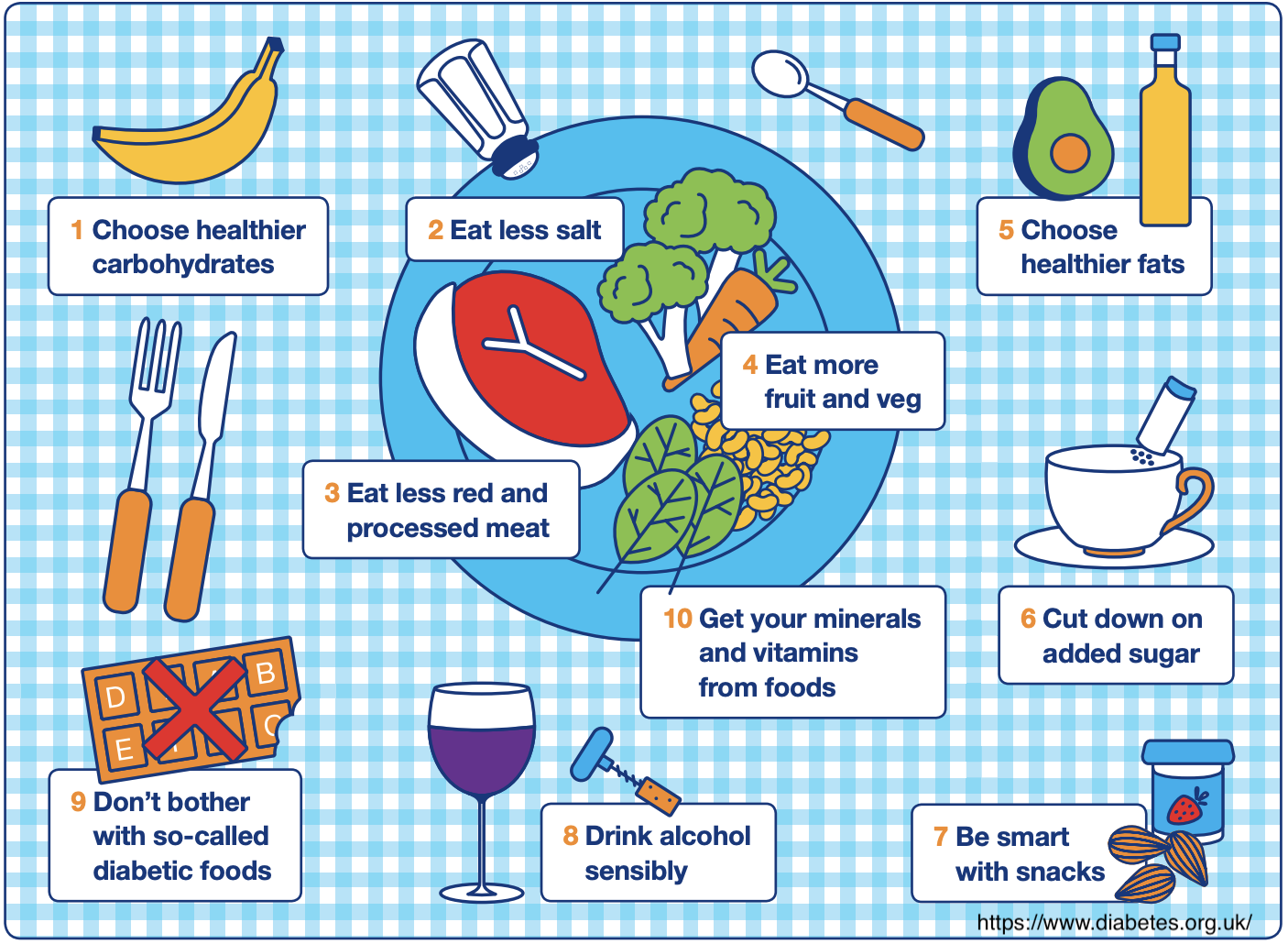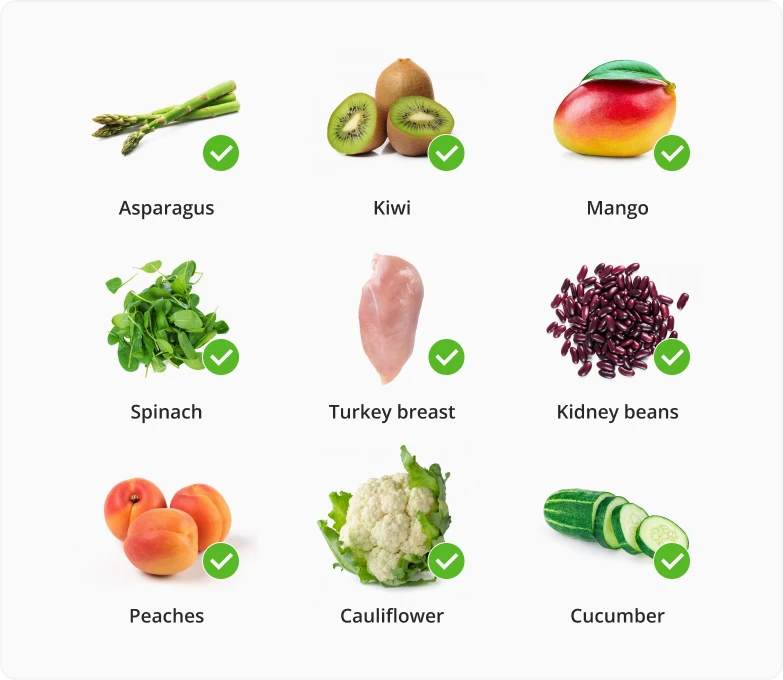
Diabetes is a chronic medical condition characterized by high blood sugar (glucose) levels. Nutrition is one of the most important aspects of diabetes management and has a major impact on blood glucose levels, overall health and quality of life. A balanced diet can help prevent complications of diabetes, such as heart disease, kidney damage, vision problems, and peripheral neuropathy. Therefore, it is important that people with diabetes follow the principles of a healthy diet and adjust their diet accordingly to the treatment plan.
Nutrition strategies in diabetes
In diabetes, nutritional strategies are critical to managing blood glucose levels, preventing long-term complications, and maintaining good health. Effective nutritional strategies include managing carbohydrates, balancing nutrients, making healthy food choices, and regulating food consumption patterns.
Carbohydrate management
Monitoring and planning carbohydrate intake is one of the main principles of diabetes management. It is important to know the amount of carbohydrates in foods and drinks and their effect on blood sugar. Patients are recommended to use carbohydrate counting, portion control, or food exchange systems to effectively plan their meals.
- Complex carbohydrates and fiber: Choices should focus on complex carbohydrates that are high in fiber, such as whole grains, vegetables, fruits, and legumes. Fiber slows the absorption of sugar into the bloodstream and can help keep glucose levels more stable.
Nutrient balance
A balanced diet with adequate representation of all the essential nutrients – proteins, fats and carbohydrates – is important in diabetes.
- Protein: Protein intake should be balanced, with preference given to lean protein sources such as fish, poultry, legumes and low-fat dairy products.
- Healthy fats: Eating healthy fats, found in nuts, seeds, fish and vegetable oils, supports heart health. Trans fats should be avoided and saturated fats should be limited.
Choosing healthy food options
Choosing healthy foods is an essential part of any nutritional plan. That includes:
- Consumption of greens and green vegetables: Green vegetables are low in calories and rich in nutrients that can help control blood sugar levels.
- Choose natural, unprocessed foods: Natural, unprocessed foods should make up the majority of your diet because they are less likely to cause sudden spikes in blood sugar.
Regulation of food consumption patterns
Regular meals and snacks can help prevent sudden swings in blood sugar.
- Regular meals: Eating smaller portions regularly throughout the day helps keep blood sugar levels stable.
- Snack planning: Healthy snacks with a balanced amount of carbohydrates and protein can help maintain energy levels and prevent excessive hunger pangs.
In addition to these basic principles, it is important to check your blood sugar regularly and consult with your health care professional to tailor your nutrition plan. It may also be helpful to consult with a dietitian or nutritionist who can help you create a personalized nutrition plan based on your individual needs, eating habits and lifestyle. Such an individual approach to nutrition can help not only manage diabetes, but also improve overall health and quality of life.

Effects of foods on glucose and how a balanced diet can improve quality of life
The effect of foods on blood glucose and how a balanced diet can improve quality of life are important considerations, especially for people with diabetes or those trying to prevent it. Foods containing carbohydrates are the main source of glucose in the body. Glucose is an essential source of energy for our cells, but controlling its levels in the blood is vital to prevent long-term health problems.
Effects of carbohydrates on glucose levels
Carbohydrates are divided into simple and complex. Simple carbohydrates or fast-digesting carbohydrates (such as sugar, white flour) quickly raise blood glucose levels, causing sudden and high sugar spikes. Complex carbohydrates (such as whole grains, vegetables, legumes) with more fiber are digested more slowly, allowing glucose to enter the bloodstream more slowly, ensuring more stable blood sugar levels.
Balanced nutrition and improving the quality of life
A balanced diet with the right balance of carbohydrates, proteins, fats, vitamins and minerals is essential not only for blood glucose control, but also for overall health and well-being.
- Carbohydrate management: Choosing foods rich in complex carbohydrates and fiber helps prevent sudden swings in blood sugar and contributes to long-term health.
- Incorporating protein: Protein helps maintain satiety and stabilizes blood sugar levels. Protein sources such as fish, poultry, legumes and nuts should be included in the daily diet.
- Healthy fats: Consuming healthy fats, found in fish, nuts and vegetable oils, contributes to heart health and can help prevent inflammation.
- Vitamins and minerals: A varied diet, rich in fruits and vegetables, ensures that the body receives the necessary vitamins and minerals that are essential for optimal functioning of the body.
Eating a balanced diet not only helps control blood sugar levels, but also improves your overall quality of life. A good diet can reduce the risk of heart disease, obesity, high blood pressure, and other diet-related health problems. In addition, it can increase energy levels, improve psychological well-being and promote healthier weight management.
It is important to note that while these general tips may be helpful, individual nutritional needs may vary. Therefore, it is recommended that individuals with diabetes or other health problems consult with a healthcare professional or nutritionist to develop a personalized nutrition plan that meets their specific needs and goals.

Information sources
- American Diabetes Association (ADA)
- Diabetes Care
- "National Institute of Diabetes and Digestive and Kidney Diseases (NIDDK)"
- The Lancet Diabetes & Endocrinology
- "Journal of Clinical Endocrinology & Metabolism"
# cukrinis diabetas






